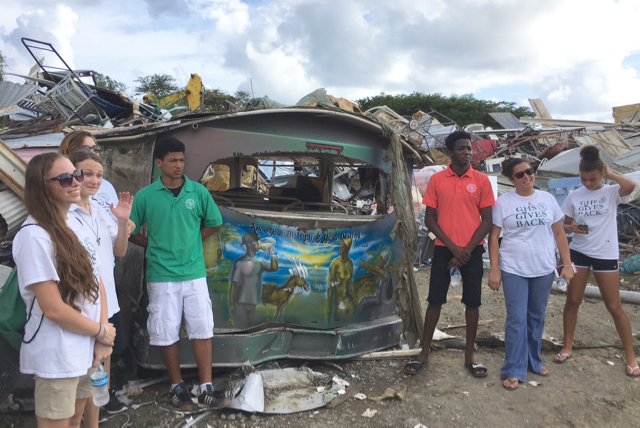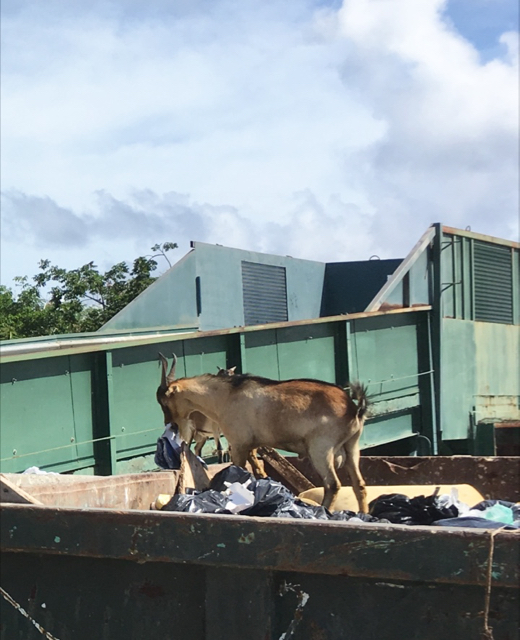
A dozen juniors and seniors from the Environmental Science class at the Gifft Hill School visited the site Friday as part of a field trip. They were participating in a program known as Youth in Action on St. John Part 2, one of a series of events organized by the Coral Bay Community Council.
The Coral Bay Community Council developed the program “as an educational experience for the youth, covering such topics as an introduction to environmental justice, what it means to be a part of a neighborhood and community, an introduction to nonprofit organizations, consequences of illegal dumping and gut littering, and more,” according to its news release.
Funded by a grant from U.S. Environmental Protection Agency, the activities are “intended to expand participation by all people as advocates for clean water and clean air and a healthy environment for all.”
The Gifft Hill School students spent part of the morning taping sound bites and video clips for public service announcements, which were composed by another group of students who participated in the first phase of the Youth in Action Program last December.
They also attended a presentation by Mario Leonard, district director of solid waste for the V.I. Waste Management Authority. Asked what they learned in the session, senior Maeven Parsil replied, “How much funding goes into sorting different types of trash.”
“It’s very expensive,” junior Zohar Sofer-Greer chimed in.

As the students toured the Susannaberg Transfer Station, where solid waste is brought and stored before being transferred to St. Thomas, they met Avery Christian, who supervises the site.
“Our job would be simple if we had the right kind of tools,” Christian told them.
Christian explained that the Transfer Station’s compactor is broken and now serves more as a shelter for goats and other animals, who roam the site because the perimeter fencing is broken. Spying a dead goat with a bloated belly lying along the road next to the entrance of the facility, Christian said, “They eat so much of the plastic, they go into seizures.”
But the solid waste situation was not as bad as it looked, Christian told the students. The mountain of broken appliances and scrap metal could be processed and removed within a couple of days, as could the field full of smashed cars, when the metal crusher/compactor arrives on island as it does semi-annually.
Before the vehicles are stored at the site, they are drained of fluids and “detoxified,” Christian said, so that oil and gas cannot run down the nearby gut and wash into the sea in Great Cruz Bay below. As they await removal, the cars are used by members of community rescue agencies to practice their skills using the Jaws of Life, a tool to extricate trapped passengers.
The mountain of tires at the Susannaberg Transfer Station presents another problem, they hold rainwater where mosquitoes can breed, leading to the spread of mosquito-borne diseases such as Zika, dengue fever, and chikungunya. Christian said until the territory develops a plan for removing the tires, all they can do is treat them with insecticides.
The V.I. Waste Management Authority has developed a plan for overhauling the Susannaberg landfill as part of the initiative to assess tipping fees, which is set to go into effect in January. Christian told the students to come back in a couple of months to see the improvements.
.jpg)
Students learned they could earn community service hours by operating the can crusher or volunteering at the Resource Depot, which sells used construction and household goods.
When students were asked by Veronica Pozas, their teacher at the Gifft Hill School, to recap the day, Parsil said, “Our entire infrastructure is in danger of collapsing unless we play a part. We need to take responsibility for our ecological footprint.”
“It’s good to get the young kids involved,” added senior Vela Culbert.
Youths and teens are invited to participate in the next Youth in Action event, scheduled for Liberty Day (Nov. 1,) a school holiday.
More information about the event is available by calling Sean Richardson at the CBCC office, 340-776-2099 or sending him email at sean@coralbaycommunitycouncil.org.





